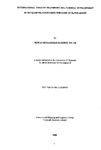INTERNATIONAL FREIGHT TRANSPORT MULTIMODAL DEVELOPMENT IN DEVELOPING COUNTRIES: THE CASE OF BANGLADESH
| dc.contributor.author | ISLAM, DEWAN MOHAMMAD ZAHURUL | |
| dc.contributor.other | Plymouth Business School | en_US |
| dc.date.accessioned | 2013-09-16T10:20:35Z | |
| dc.date.available | 2013-09-16T10:20:35Z | |
| dc.date.issued | 2005 | |
| dc.identifier | NOT AVAILABLE | en_US |
| dc.identifier.uri | http://hdl.handle.net/10026.1/1740 | |
| dc.description.abstract |
An efficient transport system is essential for an efficient supply chain to facilitate international trade. To utilise all cheaper resources, such as labour in Bangladesh, companies receive supplies from one coxintry (e.g. in Hong Kong), produce the products in another country, and sell them in other countries (e.g. European countries). Thus the production and consumption has turned into a global activity with transport filling the gaps among them. To perform the transport function a carrier may require the use of more than one mode, the so-called multimodal transport. Multimodal transport, an integrated systems approach, can be defined as the most cost- and time-effective way of moving goods from shipper to consignee by at least two different modes of transport under a single contract. The system has been operating for more than three decades in developed countries, but in developing countries the transport system is still operating in a conventional fragmented way where modal integration has not been achieved. In particular the inland part of the international transport haul has appeared as a barrier to establishing an integrated multimodal transport system. In general, the transport systems in developing countries have failed to contribute to effective international supply chain. Little research has been conducted in this field in developing countries, including Bangladesh. The present research attempts to fill this gap through a triangulation technique; an in-depth literature review of international freight transport of developing countries particularly Bangladesh and developed countries; two rounds of Delphi study among a Bangladeshi panel; and a quantitative study based on a survey. The research hypothesises that Uhe extent to which a fragmented freight transport system can be transformed into an integrated multimodal transport system depends on the present state of the country'. The validity of the hypothesis was established through triangulation. The research also found that there has been a significant freight transport multimodal development in Bangladesh but it has not been perceived by the stakeholders. | en_US |
| dc.language.iso | en | en_US |
| dc.publisher | University of Plymouth | en_US |
| dc.title | INTERNATIONAL FREIGHT TRANSPORT MULTIMODAL DEVELOPMENT IN DEVELOPING COUNTRIES: THE CASE OF BANGLADESH | en_US |
| dc.type | Thesis | |
| plymouth.version | Full version | en_US |
| dc.identifier.doi | http://dx.doi.org/10.24382/3630 | |
| dc.identifier.doi | http://dx.doi.org/10.24382/3630 |
Files in this item
This item appears in the following Collection(s)
-
01 Research Theses Main Collection
Research Theses Main


